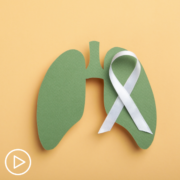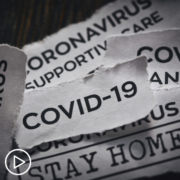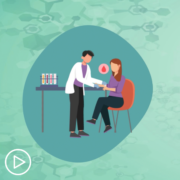Advice for Small Cell Lung Cancer Patients Considering Clinical Trials
Advice for Small Cell Lung Cancer Patients Considering Clinical Trials from Patient Empowerment Network on Vimeo.
What’s vital for small cell lung cancer (SCLC) patients to know about clinical trials? Dr. Rafael Santana-Davila with the University of Washington School of Medicine explains the impact of clinical trial on treatment advancements and questions for patients to ask when considering clinical trial participation.
[ACT]IVATION TIP
“…if you’re considering a clinical trial, to make sure you read that consent. And that consent can be difficult sometimes. So if you have questions, just ask. When patients are on clinical trials, there’s a whole team of people that are looking for that patient. So ask the questions that you may have from that consent with that patient.”
See More from [ACT]IVATED Small Cell Lung Cancer (SCLC)
Related Resources:

|

|

Key Resources for Small Cell Lung Cancer Patients and Families |
Transcript:
Lisa Hatfield:
Why is clinical trial participation so important in small cell lung cancer? And what advice do you have for patients considering one?
Rafael Santana-Davila:
So clinical trials are very important, not only in small cell lung cancer, but in all cancers. The only way that we know how to treat this is by doing clinical trials. That is what moves the needle forward. It’s thanks to patients that participate in clinical trials that we know whether something worked or how much worked or something did not work, and we need to either get back to the drawing board or eliminate that possibility and move on.
Unfortunately, only the minority of patients participate in clinical trials and that is many times only because of access. So it’s important for patients to consider clinical trials. That is where we’re analyzing the future medications, and many of those future medications will become the standard of care and by participating in clinical trials, patients will have access to those medications.
And by participating in clinical trials, patients are also paying it forward. These clinical trials may not help them as much as possible, but they are helping those patients down the line. When patients are considering a clinical trial, there’s many questions that they need to ask is, “What does that involve for me? How frequently do I need to come to the cancer center? Aside from getting it, what else is asked from me? Am I being asked to also come to other blood draws, for example, or am I just receiving this treatment and that’s treatment by itself? Is there a randomized component to this clinical trial? Am I being elected to receive one arm or the other? Is there a placebo component in that trial?” The majority of patients with the majority of trials in cancer are not placebo-based.
But that’s important to know. “What help can the clinical trial give me?” Again, like we talked about, many clinical trials can help patients with lodging or transportation. So the activation tip for that is, if you’re considering a clinical trial, to make sure you read that consent. And that consent can be difficult sometimes.
So if you have questions, just ask. When patients are on clinical trials, there’s a whole team of people that are looking for that patient. So ask the questions that you may have from that consent with that patient. And I always encourage a clinical trial because again, that is what is helping us move the needle forward.
Share Your Feedback:
Create your own user feedback survey















